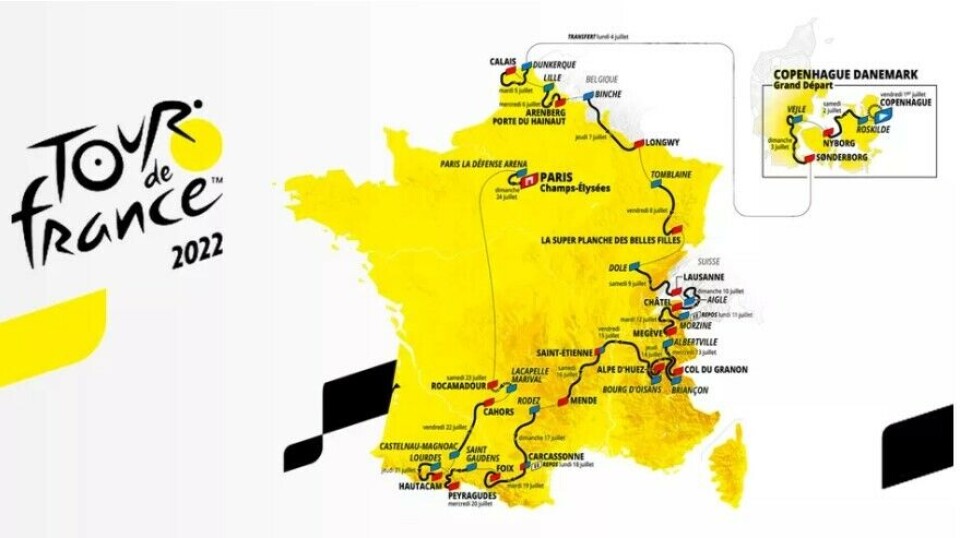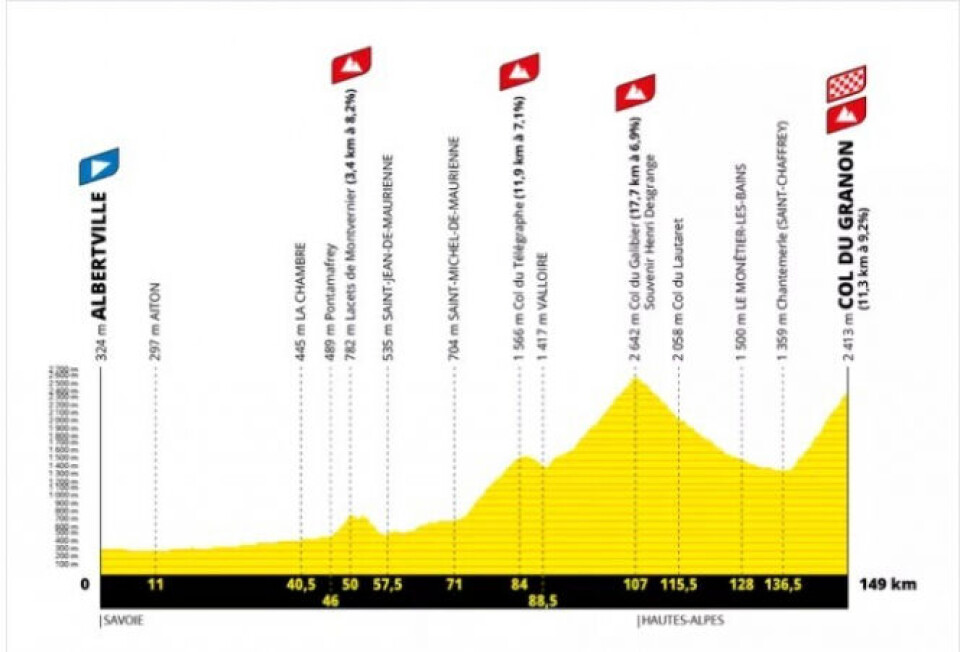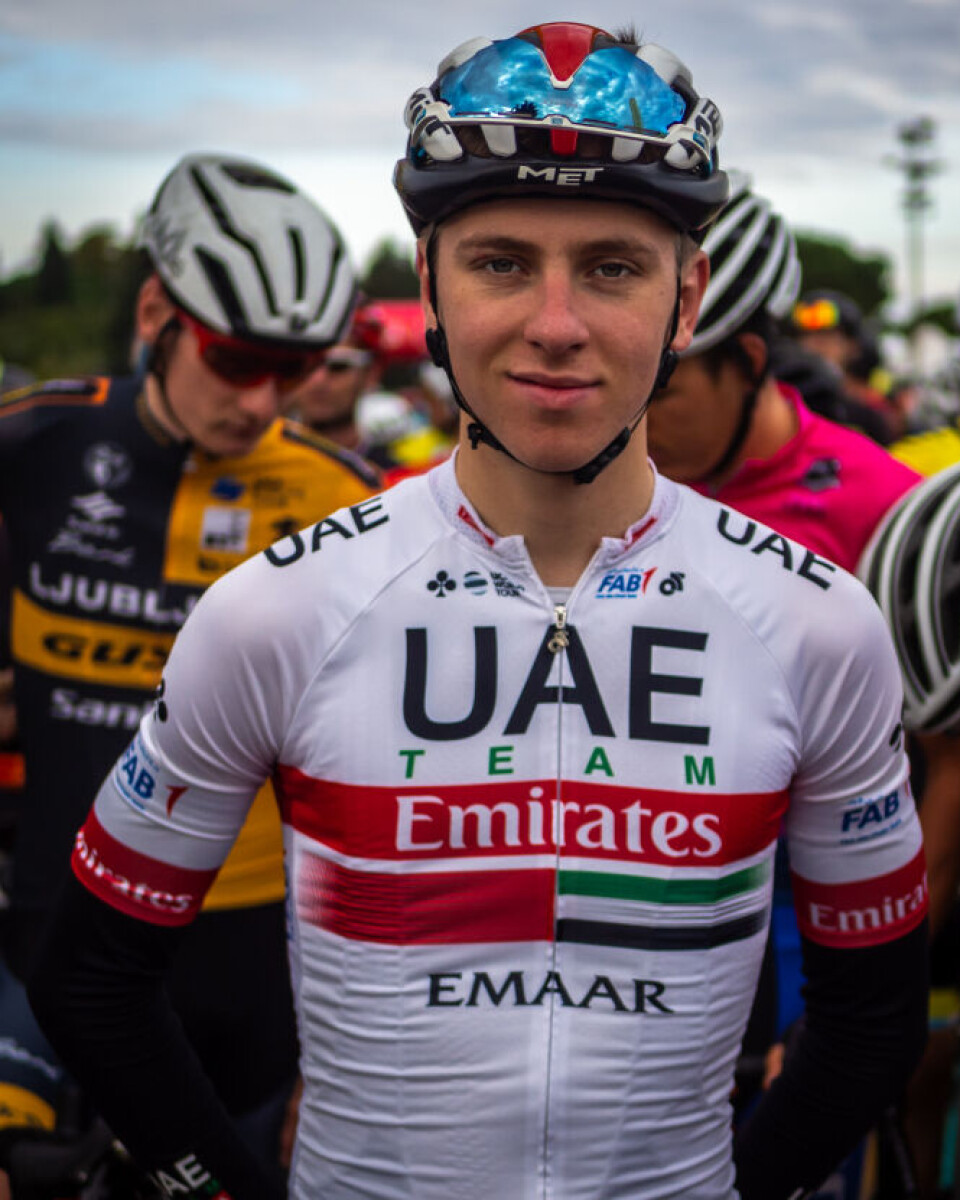-
Britons are the largest foreign community of second-home owners in Nouvelle Aquitaine
See which other departments in the region are popular with British nationals
-
Travellers risk extra costs under new Eurotunnel ticket rule
Some fare options are less flexible and less forgiving of lateness
-
May will be difficult month for train travel in France, warns minister
Two major train unions are threatening to strike and are ‘not willing to negotiate’, he says
Tour de France 2022 route revealed: will it pass near you in France?
The race will move from Dunkirk across the Vosges, Alps and Pyrenees, after beginning in Copenhagen - and 2022 also sees the return of the women’s ‘Tour’

The route of the 2022 Tour de France has been revealed today (October 14), along with the return of the women’s race after 12 years.
Next year’s 109th Tour will begin on July 1 in Copenhagen in Denmark, a city chosen for its cycle-friendly attitudes, in the hope of promoting “cycling in everyday life” around the world.
The race will then move round northern, eastern, southern and south-western France – dropping briefly into Belgium and Switzerland along the way – before circling back to Paris’ Champs-Elysées on July 24.
After an against-the-clock contest along the streets of Copenhagen, the second day will take place in the fjords of “Viking country” between Roskilde and Nyborg, the riders travelling over the Great Belt Bridge running between the islands of Zealand and Funen.
The third stage will also move through Denmark, but by day four of the race the riders will be back on French soil, completing a tricky route between Dunkirk and Calais, passing over the Griz-Nez and Blanc-Nez Caps while battling against the winds of the Côte d'Opale.
On July 6, the riders will begin in Lille, covering nearly 20km of cobblestones as they race towards the ‘Pont Gibus’ sector.
July 7 will mark the longest stage of the Tour, starting in the Belgian town of Binche and covering 220km to reach Longwy in Meurthe-et-Moselle.
The Tour will then turn towards the Vosges mountains, confronting the challenging climb up to La Planche des Belles Filles ski resort, which involves a stretch on a road at 20% and another untarmacked section at 24%.
The ninth stage will begin in the Jura at Dole, before dipping into Switzerland and ending in Lausanne. Another race from Aigle back into France and the town of Châtel will bring the competitors to a well-deserved rest day.

On July 12, the riders will move over the French Alps between Morzine and Megève. The next two days will see them climb Les Lacets de Montvernier (at 782m), Le Col du Télégraphe (at 1,566m), Le Col du Galibier (sitting at 2,642m) and finally Le Col du Granon at 2,413m.

On the day of the Fête Nationale (July 14), the race will begin in Briançon, taking its competitors once again over Le Col du Galibier, as well as La Croix-de-Fer and the 21 hairpin bends up to Alpe d’Huez.
These alpine stages will be followed by the flatter landscapes between Bourg-d’Oisans and Saint-Étienne, Saint-Étienne and Mende, and Rodez and Carcassonne.
After a rest day, the riders will tackle the Pyrenees, heading for Foix on July 19 via the Port de Lers and its 11.4 km at 7%.
This will be followed by two short but difficult climbs to the Aérodrome de Peyragudes Altiport and to Hautacam, which sits at 1,520m above sea level.
The 19th stage of the 2022 Tour will take place between Castelnau-Magnoac and Cahors, with a race against the clock finish. The penultimate day will cover 40 km between Lacapelle-Marival and Rocambour, before the riders arrive in Paris from the final sprint between La Défense Arena and the Champs-Elysées.
With 3,328km, the Tour de France 2022 – whose route was announced during a presentation at the Palais des Congrès de Paris –is the shortest since 2002 (3,278km).
The 2020 and 2021 races were both won by Slovenian Tadej Pogačar, who is also the favourite to win in 2022.

Around 840 million people around the world engaged with the 2021 Tour on social networks or by watching it on television.
Tour de France Femmes
Next year will also mark the first Tour de France Femmes since 2009, which will begin in Paris on July 24 and cover 1,029km over eight days.
From their starting point at the Eiffel Tower, the competitors will move around Paris during the first stage before leaving the city for towns including Meaux and Provins in the second, and then Reims and Épernay in the third.
The race will then continue east towards the Vosges mountains and Alsace, passing through Rosheim, Sélestat and Le Markstein, and over the highest Vosges peak, Le Grand Ballon, which sits at 1,424m above sea level.
The final stage of the women’s Tour will see competitors climb over 7 km at 8.7% to La Planche des Belles Filles.
"It's a balanced route that will suit several types of riders," race director Marion Rousse said.
Some of the favourites to win the yellow jersey include the Dutch riders Marianne Vos, Annemiek van Vleuten and Demi Vollering, as well as Britain’s Lizzie Deignan, Italy’s Elisa Longo Borghini and France’s Juliette Labous.
Christian Prudhomme, the director of the men’s race, has said that he hopes the Tour de France Femmes will be a success, but that it may be difficult to ensure its financial viability.
"If it had been [sustainable], the women's Tour would have been held for 40 years," said Mr Prudhomme before today’s presentation ceremony.
"The biggest challenge is to broadcast the race. I think we've done a good job, with the race starting the same day as the men's race ends in Paris."
Around 170 countries are expected to broadcast the first stage of the women’s Tour.
You can find more information about the 2022 routes on the Tour de France website.
Keen amateur riders can also experience cycling the different stages of the Tour through the Etape by Tour de France.
Related stories
Paris 1900: The record-breaking Olympics that few people knew about
Chris Froome shares joke after French reporter fails to recognise him
























